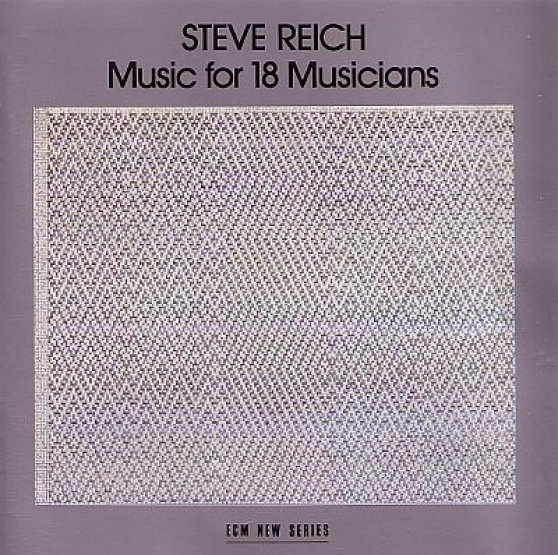
(This is one of a series of posts we’re running on what inspires us as facilitators and designers here at Collective Next.)
There’s a new recording out of a famous 20th century music composition, Steve Reich’s Music for 18 Musicians, a piece that inspires me deeply.
The first time I listened to Music for 18 Musicians was when I was an undergrad. It changed my life. It changed a lot of lives. It was a revolutionary piece. I first heard it in a record shop. The zigzag cover got my attention and I knew a few of Reich’s pieces at the time. I handed the CD to the guy behind counter, and I asked him to play it. After a few minutes, I asked him again to put it on because it didn’t sound anything like the instrumentation listed on the back of the CD; I wasn’t hearing any acoustic instruments. Record-shop-guy assured me this was indeed Music for 18 Musicians. I stood there in complete wonderment. I was taken aback that wind instruments and strings could do this, specifically that it was so tight, that he was able to make these sounds with traditional chamber instruments. It sounded electronic; it was mind-opening that people could make those sounds together as an chamber ensemble.
After listening to the piece a few times, I quickly came to love how the it was about the slow unfolding of a musical process. The process morphs over time, but it’s based on an underlying structure. At the same time it’s both very neat and contained, yet explores quite a bit of variation. This piece is all about breaking boundaries and maxing out what you can do within a set of structures. There have been revolutions going on in music since the beginning of music. My colleague Matt talks about breaking boundaries within the realm of punk. We’re in a completely different sound world here with Steve Reich, but it’s just as surely about breaking boundaries and norms.
There are two levels of inspiration for me here. The first, and most obvious is how the “newness” and the structure of the music opens a young mind beyond what he has learned. New possibilities, new directions to pursue, new chances to take. The other level that is inspiring is that Steve Reich wrote a lot of music like this. How does someone keep coming up with something that distinctive and still have it sound exploratory? How do you continue to inspire yourself to be the best at your particular craft, when you’re already pretty damn good at it? (If you want to learn what inspires Reich, read some of his Writings.) You can break the mold and then create it; the style/quality of music that Steve and others like Terry Riley (who I’ve written about previously here) create went from being iconoclastic to now being iconic. Without a doubt, Music for 18 Musicians represents a certain time in music history now. It defines a time. You can’t compose music in this fashion right now without blatantly referencing that period of time.
For all of us that do what we do, how do we keep what we do fresh? How do we continue to be creative, and inspire ourselves? Part of it is continuing to pursue excellence. Whatever you’re doing can always be done better. I stumbled on an Eleanor Roosevelt quote recently: “Great minds discuss ideas. Average minds discuss events. Small minds discuss people.” By always pushing your ideas forward, you always set another challenge for yourself. And if you aren’t inspired to achieve your own challenges, I don’t know what will inspire you…
In our work at Collective Next, as in any art, sometimes it’s all about process. Something that you think is a completed project isn’t really. It’s an ongoing process. Think about Reich, who has now recorded Music for 18 Musicians four different times since 1976. He keeps re-recording it. It’s not done. I don’t know that it’ll ever be done. It’s not dramatically different each time. Sure you can hear the differences in interpretation and skill level of the musicians, but the pulses are still pulses. Each time the pieces is performed, there’s some redefining and recreating happening. I’ve heard the piece performed live and it was yet another completely different interpretation than any of the recordings. It’s OK if it comes out different. All of this is not unlike Collective Next, where we love to take our clients through process, get them from beginning to end, and see what they learn and change along the way. Whether we’re designing workshops or videos, we’re always looking for a new way to do it, a more mind-opening way to do it. There’s an underlying structure and philosophy, but we’re not set by any means in the realization of that structure. Every single time can be an inspiring and energizing and exciting experience. It’s all about how you integrate the discovery of the new into what you do already.
That’s why we do what we do.
Back



